#Immortal Yuding
Text
New Gods: Yang Jian (2022) 新神榜:杨戬


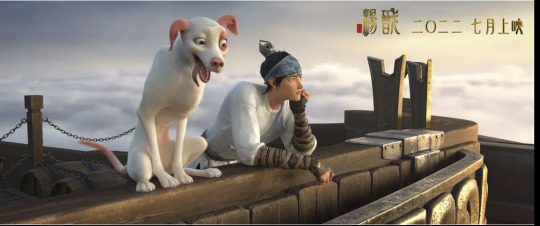
Director: Zhao Ji
Screenwriter: Wang Wei
Starring: Wang Kai / Ji Guanlin / Li Lihong / Li Lanling / Zhao Yi / Liu Xiaoyu / Wen Jingyuan / Tang Shuiyu / Xingchao / Qiu Qiu / Yang Tianxiang / Meng Yu / Yang Mo / Zhao Mingzhou / Li Nan / Lin Qiang / Liu Cong / Jin Li / Shen Liangjun / Zhao Ji / Hu Yajie / Han Le
Genre: Action / Animation / Fantasy / Adventure
Country/Region of Production: Mainland China
Language: Mandarin Chinese
Date: 2022-08-19 (Mainland China)
Duration: 127 minutes
Also known as: New Gods: Yang Jian
IMDb: tt19757204
Type: Reimanging
Summary:
Fifteen hundred years after the War of Shang and Zhou, the world of heaven declined, and Yang Jian, who had been wronged and downtrodden, made a living as a bounty hunter. One day, Yang Jian accepted a reward from a mysterious visitor to hunt down a young man, and unexpectedly discovered that the young man was his nephew Liu Chenxiang. Chenxiang is determined to find the lotus lantern and cut down the mountain to save her mother, but this will lead to a catastrophe. Yang Jian embarks on a journey to find Chenxiang and uncover the dusty past...
Source: https://en.hkcinema.ru/film/47909
Link: https://www.dandanzan.com/dianying/108153.html
#jttw media#New Gods: Yang Jian#新神榜:杨戬#jttw movie#movie#animation#cgi#reimagining#continuation#yang jian#erlang shen#liu chenxiang#sun wukong cameo#Shen Gongbao#Wan Luo#Immortal Yuding#Howling Sky Dog#Gourd Immortal#yang chan#yao ji#Tailwind Ears
26 notes
·
View notes
Text
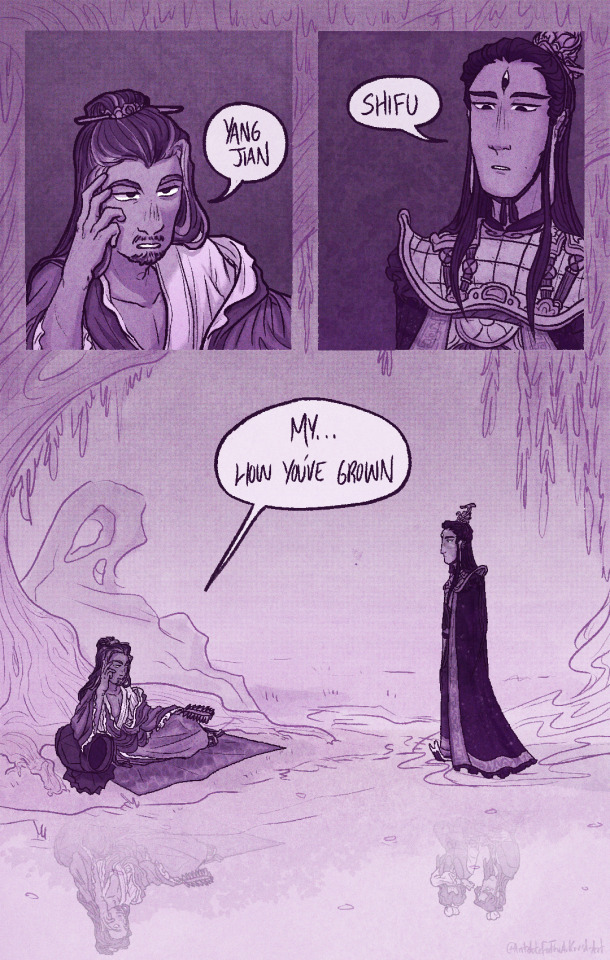
One must wonder how Yuding Zhenren feels during the events of Lotus Lantern...
[ID: A monochrome purple comic. In the first panel is Yuding Zhenren from the shoulders up, resting his head on his hand while reclining and looking up with a cold, angry expression, saying "Yang Jian." In the second panel is Erlang Shen from the shoulders up, looking down at Yuding Zhenren with a detached expression, responding "Shifu." The third panel zooms out to show Yuding Zhenren reclining on a mat while looking up at Erlang Shen, who is standing a few feet away. Yuding Zhenren says, "My... How you've grown." Yuding Zhenren and Erlang Shen both cast reflections on the pond beside them. While Yuding Zhenren's reflection looks largely unchanged, where Erlang's reflection should be, are the image of him and his sister as kids, crying and kneeling in front of Yuding Zhenren. End ID]
#my art#lotus lantern#investiture of the gods#fengshen yanyi#chinese mythology#erlang shen#yang jian#yuding zhenren#oguhjhgdjfkdfk not entirely satisfied with how this looks but i think i am rusty#'yang jian- i went gray over you and your sister. do you know how hard it is to start greying when youre of my cultivation level.'#yuding zhenren definitely didnt disown or banish erlang shen bc heavenly politics and bc he's still attached to erlang#but#ough things were definitely different between them after erlang shen sealed sansheng mu away#'你还有脸认我这师父?you still have the face to recognize me as your shifu?' type vibes#also i love the idea of messy brash swk having the most uptight dignified sifu while the put-together erlang has a messy shifu#yuding zhenren's design partially inspired by huang yaoshi of condor heroes (2011) but mostly just the general 'drunken immortal' aesthetic#also this is purposefully paralleling the dialogue i did for that swk puti reconciliation comic <3 bc foils <3#patriarch puti was cold and detached when he banished swk but i think yuding zhenren would throw shit at erlang and yell '你疯了吗!?'
219 notes
·
View notes
Text
Ask/Writing Masterlist (irregularly updating)
Ryin(阿璎), 23. She/They. First Gen Chinese student. Ryin_Silverfish on AO3. Currently hyperfixating on old Chinese novels. casual Zhiguai tales and LMK enjoyer.
Investiture of the Gods/FSYY:
Why are the Daoist immortals fighting?
Did Yuanshi Tianzun manipulate Shen Gongbao?
Chan, Jie, and possible prejudice against yaoguai
Azure Lion and the other Bodhisattvas' steeds in FSYY
Daji's fox form in FSYY Pinghua
The historical Su Daji
Is Shen Gongbao a yaoguai?
Are all yaoguai irredeemable monsters in FSYY?
Ao Bing and the dragons Nezha fought
Does deification wipe your memory and personality?
Bi Gan and the Great Fox Massacre
More discussion about prejudice against yaoguai
How old was Su Daji the human when she died?
Differences between FSYY novel and Pinghua
Musing on FSYY's view of fate and its possible effects on Yang Jian
Master Yuding
The messy marriages of FSYY
Is Daji a goddess in the novel?
Names of immortal masters in FSYY
Just for fun: the FSYY drinking game
Nezha's age in FSYY
Nezha's death and resurrection in FSYY
What happened to the original Daji?
Lady Shiji aka the Rock Demoness
Chinese Fox Spirits:
Auspicious/Demonic Foxes
More on fox spirits
The inner core of foxes
Foxes and their association with Fire
Notable fox spirits
The foxes of 狐狸缘全传
Has Daji ever been worshipped as a goddess?
Fox masks
The foxes of Liaozhai
Weaknesses and abilities of fox spirits
Three resource collections on Chinese fox spirits: 1, 2, 3
Human-fox hybrids
Can foxes and their descendents magically know if someone's telling the truth?
The magical properties of fox saliva
Fox exams and Heavenly Foxes
Are male foxes more malicious?
More on fox exams
Offerings to fox spirits
The "Lady Fox Immortal"
Chinese Mythos in General:
The Precious Scroll of Erlang
Into the Erlang-verse: Li, Zhao, Yang
Can immortal masters romance their students?
Why we don't power-rank characters in God-Demon novels
A brief overview of Chang'e
On Chinese Religion and "Respect"
The 28 Lunar Mansions
Can the Heavenly Emperor be replaced + a primer on dynastic successions
A Guide to the Chinese Underworld (and what it isn't)
Is Nüwa JE's daughter?
Weaver Girl
Can yaoguais a/o their descendents enter the Celestial Bureaucracy?
Queen Mother of the West and her husband(s)
Bixia Yuanjun, Lady of Mt. Tai
Erlang's dad
The story that gives us the name "Yang Jian"
On the transformation of Erlang's image (and his relationship with JE in JTTW)
Erlang's mom, Lotus Lantern, and a neat little discovery
Erlang cameos in other stories and Zajus
Erlang's mom-saving story in Chinese operas
Child Manjushri, or: the absurdity of pinning a definitive age on gods
The strange modern ship of Mengpo/Yuelao, and Mengpo's myths
The half-beast form of QMoW
Does Erlang have a wife/love interest?
Nezha's mom
A overview of Gonggong and his mythos
Some introductory sources on the Chinese Underworld
A side-by-side comparison of Nezha's backstory in JTTW and FSYY
Mythos-inspired Worldbuilding:
Dragons of the Four Seas
LMK S5 and a possible "Celestial Council of Regents" AU
LMK S5 Fix-it: the Four Divine Beasts
Character/Story Analysis (JTTW + LMK)
Heart and Mind: Tripitaka
Local Lion Uncle enjoyer goes on a rant
On SWK and his fear of death
Why the Dead People Supreme Court?
No, seriously, why?
Chinese Underworld =/= Christian Hell
LMK S4, Havoc in Heaven, and revolutions
Why I dislike the "class warfare" reading of Havoc in Heaven
In Defence of Li Jing...ha, as fucking if
On Yin-Yang, Chaos/Order, and the Harbringer
JTTW's view on the Three Religions
Disjointed S5 Reactions
"Chaos doesn't work that way in traditional Chinese Cosmology"
Xiangliu, the Nine-headed Bird, and Jiutou Chong
Lotus Lantern: The Summaries
Part 1: Precious Scroll of Chenxiang
Part 2: The Epic of Prince Chenxiang
Part 3: Lotus Lantern 1.0 + 2.0
Part 4: Chenxiang and the Male-Female Swords
My Fanfics:
Climbing the Sky
The Wild Son
Bodhicitta
The Serpent and the Deluge
South Seas Sojourn
Journey of the Gods AU sideblog
197 notes
·
View notes
Note
golden cicada, since you were a cicada, have you ever sung to find a partner, like your brothers?
I know that cicadas live a long time underground and all their young emerge at the same time to reproduce. This as a method of survival and ensuring the greatest number of future offspring. And then the cicadas die after reproducing.
Do you remember your brothers?
Tripitaka, have you ever felt the desire to sing like in your past life? I know you like poetry and nature. Do you feel connected to your insect half?
Wukong, have you ever been curious about the taste of golden cicada? If you had not met Tripitaka, would you have eaten the monk Tripitaka? If you had met the golden cicada when you were younger, would you have eaten Golden Cicada?
I heard that golden cicadas are a delicious dish for Chinese people.
Golden Cicada: Uhm ... yes and no. The answer to this is kind of complicated. I have never mated, because by the time I reached adulthood, I was a full blown spirit with a mind of my own.
Golden Cicada: The forest, where I was laid as an egg, is the home of my original master, Yuding Zhenren, a Golden Immortal whose magic fills the forest. Of course my siblings and I all paid our respects to him after emerging from the earth, but that's where we parted. They were content with mating and dying, like you said, but that wasn't enough for me. I wanted to be immortal, so I became Yuding's disciple.
Golden Cicada: But while I never reproduced, I do still sometimes sing at night. Partly in memory of my dead siblings, but mainly to annoy my fellow disciples. *snickers* I kept that habit, even after I converted and followed the Buddha. It'll never not be funny!
.
Tripitaka: Oh, I do like singing! I'm not comfortable doing it in front of others, though. I get stage fright. And yes, I also love poetry and nature. They relax me. :)
Tripitaka: Well ... to be honest, I have mixed feelings about Golden Cicada. Since becoming the Buddha of Sandalwood Merit, I remember when I was them, but they feel so ... wrong. Not wrong as in, a horrible person I'd never want to be, but more like ... someone I'm expected to be, but am not. Being treated like them feels wrong. Being called by their name feels wrong. They're a stranger. We have few things in common. That person ... isn't me.
.
Sun Wukong: Hmm ... no, I've never thought of that. It wouldn't even have been easy, because Three-Eyes (Erlang Shen) has told me some stuff about them that actually makes me think they could've kicked my arse. And that I would've chipped my teeth on Golden Cicada's exoskeleton.
Sun Wukong: But yes, we do sometimes eat insects. When prepared right, they're pretty tasty! Still kinda unsettled me, when my master said that if he wasn't a vegetarian he'd eat cicadas purely to spite his past life. I ... I think he needs help.
11 notes
·
View notes
Note
Who are the Twelve Golden Immortals that Taigong keeps mentioning? Are they his superiors?
The Investiture of the Gods has Taigong Wang as the Taoist currently studying under Yuanshi Tianzun and the Twelve Golden Immortals as the 12 disciples who already graduated under Yuanshi Tianzun before Taigong and are full-fledged Xians by the time of the Investiture (the 1100s BC). Not all of them are particularly relevant characters, be it in the actual Investiture or in Houshin Engi.
1) Taiyi Zhenren
About as minor of a character as any of the 12 in the myth, but easily the one with the most screentime in Houshin Engi. Taiyi's main contribution to Taigong's cause was creating the Soul Jewel, which he put inside Li Shi and Li Jing's stillborn baby, allowing Li Nezha to come to life as a living weapon you know from FGO. After Nezha's suicide, Taiyi also arranged Nezha's revival, so he's who FGO blames for Nezha's unfortunate genderbend. Once Nezha is back to life and learns what his father did to his grave, Nezha goes to beat the shit out of his dad, but Taiyi intervenes, capturing Nezha in the Nine-Dragons Divine Fire Basket so he can give him a proper Taoist education and giving Li Jing the means to fight back if Nezha attacks him again (remember that Li Jing is Bishamonten, so the weapon that Taiyi gave him here is actually the pair of towers Kagetora uses on her 3rd Ascension).
2) Yuding Zhenren
Yang Jian's mentor (doubles as Yang Jian's foster father in Houshin Engi). User of the Xian-Slaying Sword. One of the few that gets to be really cool in Houshin Engi but sort of a complete jobber in the original Investiture.
3) Qingxu Daode Zhenjun
Huang Tianhua's mentor. Contrary to Yuding, he's a jobber in the manga but in the myths, he's the one who gets to beat Wang Tianjun, the second-in-command of the Ten Heavenly Lords.
4) Puxian Zhenren
Boddhisattva Samantabhadra's Xian form before he attained Buddhahood. The guy who gets all the homoerotic ship tease with Taigong in Houshin Engi. By Type-Moon's syncretism laws, he's probably the Buddha form of Kouga Saburou.
5) Daoxing Tianzun
Wei Hu's mentor. Comic relief in Houshin Engi. Otherwise irrelevant. Wei Hu himself is pretty irrelevant in the Investiture, but he's known as Skanda in Hindu/Buddhism and is extremely popular in Japan. You might have heard of him before by his Japanese name Idaten.
6) Guang Chengzi
Before being featured in the Investiture of the Gods, this one already had made an appearance in Shenxian Zhuan, where he is portrayed as just a disguise used by Laozi to instruct the Yellow Emperor. But here he's one of Yuanshi Tianzun's apprentices. Does it make sense for Laozi to be Yuanshi Tianzun's pupil? Not much, they should be even-ranked, even if you don't subscribe to the idea that they're the same individual. Maybe it can work if you write him as the first disciple. That said, his combat record fits his possibly Laozi status, having defeated many named enemies including the leader of the Ten Heavenly Lords.
His main role in both the Investiture and its manga counterpart is saving Prince Yin Jiao from Daji by taking him as his Taoist pupil. After training the prince, he lets Jiao return to the world under the condition that he won't betray his mentor to join the war on his father's side. After some tempting words from the villains, Jiao betrays his mentor to join the war on his father's side, so Taigong kills him (what's the best fight in Houshin Engi) but makes him the god of Jupiter under the divine name Taisui Xingjun. Later FGO released Taisui as the cutest event welfare, causing the tragic prince to finally gain Japanese and English Wikipedia pages.
7) Chi Jingzi
The doting mentor of the other rescued prince, Yin Hong. Background character in Houshin Engi but in the Investiture, he gets a decent amount of screentime, which includes a few arcs of invading enemy territory with a lot of powerful Xian treasures, dropping an important one there, needing to invade again to recover the item he forgot there, and then dropping another, rinse repeat. Also when the prince brothers break the promise of not siding with their father in the war, he has a major emotional breakdown and, covered in tears, burns his dear pupil to ashes.
8) Lingbao Dafashi
Actual pack filler. Doesn't do anything notorious in any myth or adaptation. The best I can offer as trivia is that his weapon in Houshin Engi is the Bell of Fallen Souls, which Taisui uses in FGO.
9) Ju Liusun
Buddha Kakusandha's Xian form before he attained Buddhahood. Background jobber in Houshin Engi, but in the Investiture, he wins a major fight and has his own arc about fighting a traitor apprentice but ultimately forgiving and reaccepting his pupil after learning he betrayed because he married a woman on the enemy side. Said redeemed pupil and his wife eventually die anyway in a fight against the same guy who kills Huang Feihu.
10) Wenshu Guangfa Tianzun
Boddhisattva Manjusri's Xian form before he attained Buddhahood. Background jobber in Houshin Engi, and in the Investiture, while he wins a few major fights, he doesn't really get a personal arc. The closest he gets is a small role in Nezha's backstory. It's weird how little Manjusri gets in terms of stories despite being such a popular Boddhisattva.
11) Huanglong Zhenren
If you thought Lingbao Dafashi's situation was dire, you're not prepared for how pitiful Huanglong is. In the Investiture, he's pretty much only there to get his ass kicked by a guy who is not even relevant enough appear in Houshin Engi. In the Houshin Engi manga, he doesn't get a named Paope. In the Houshin Engi artbook, the author gets his name wrong. Dude can't catch a break.
12) Cihang Zhenren
Boddhisattva Avalokitesvara's Xian form before they attained Buddhahood. The same Guanyin that appears as a main character in Journey to the West. The same Kanzeon from the Iori Buddha statues post. They don't do much here outside of some major fights, but that's fine enough when they have so much presence in Journey to the West.
29 notes
·
View notes
Text
Cultural Annotations on New Gods: Yang Jian -Part 2-
Part 1
Shen Gongbao was an original character from IOTG not rooted in mythology. In it, he defected from the Chan Sect to assist the tyrannical King Zhou of Shang against the forces of justice. There are several adaptations misrepresenting Shen Gongbao as a leopard spirit, or that he rode a leopard however none of these were in the original text. His white tiger in New Gods is accurate.
His character design is a nod to poet Liu Ling, one of the “Seven Sages of the Bamboo Grove”, who was an alcoholic. The poem he recites outside the lighthouse was “Ode to the Virtue of Wine” by Liu Ling.
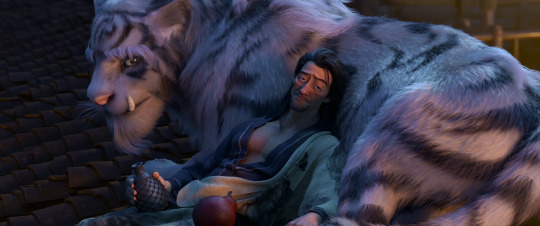
The concentric circle design of the portal resembles Ancient Chinese jade pendants from the Western Han Dynasty. The recent winter olympic medals are also inspired by the same pendants. It rotates like an armillary.

The stamp on the crate of cosmic gas is that of the White Tiger, one of the Four Symbols of the Chinese constellations, guardian of the cardinal direction of west. The same stamp was on the crates at the gas station, and the teller was servicing at "Yin window" (寅字口). Yin is the third of the twelve Earthly Branches, which correlates with the year of the tiger, hence the tiger symbol.
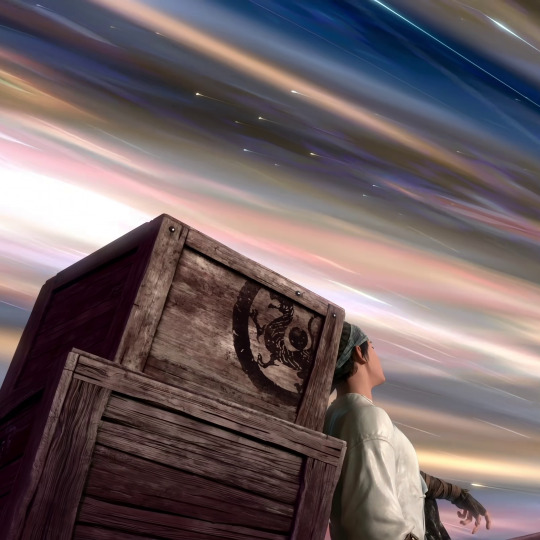

Yingzhou is based on the Yueyaquan sand dunes in Dunhuang, a cradle of Buddhism in China, located in Northwestern Gansu.

The nearby Mogao Caves famously depict murals of the Flying Apsaras, represented by Wanluo’s dance in the Yingzhou Music Hall. The song the “Ballad of the Luo River Goddess”, was written by Cao Zhi, whose poetry was greatly revered during the Southern and Northern Dynasties where the movie takes place, so the timeline checks out.
youtube
Pigsy, is that you?
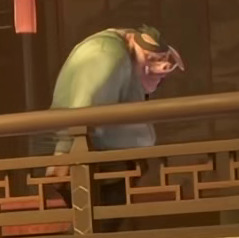
Mo Lishou mentioned that Yang Jian also used underhanded methods to capture them. This is a reference to the incident in IOTG when Yang Jian deliberately let himself be eaten by his mink, killing it from within and transforming himself into the mink to infiltrate the brothers’ hideout in order to steal Mo Lihong’s havoc umbrella.
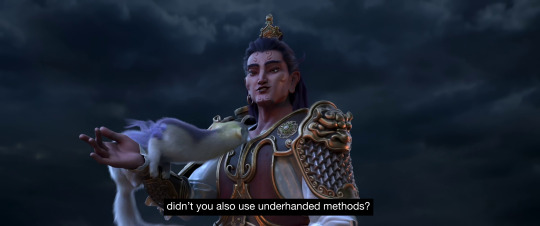
Surprisingly, Yang Jian’s title on his arrest form is still “True Monarch of the Pure Source”. His full title is the True Monarch of the Pure Source, Great Heavenly Deity of Justice (Qingyuan Miaodao Zhenjun, 清源妙道真君司法大天神), a status bestowed to him by his uncle the Jade Emperor. Ironic that the god of justice gets thrown into jail.
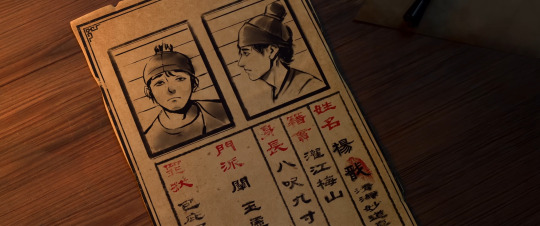
Prison gates were traditionally guarded by Bi’an (狴犴), the seventh son of the dragon king, a dragon-tiger hybrid. The one behind the pillar should be Bi’an.
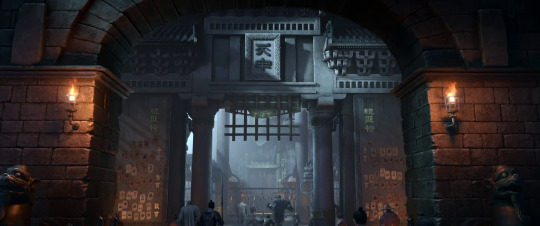
The cute bronze dragon at the bell tower is Pulao (蒲牢), fourth son of the dragon king. He is a small four-legged dragon-toad hybrid who likes to scream, and is usually represented on the tops of bells, used as handles.

He is nested on top of the Azure Dragon (青龍 Qīnglóng), another one of the Four Symbols of the Chinese constellations, representing the cardinal direction of east.
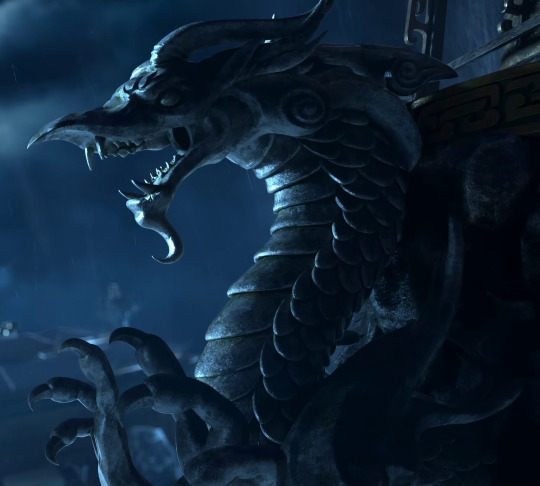
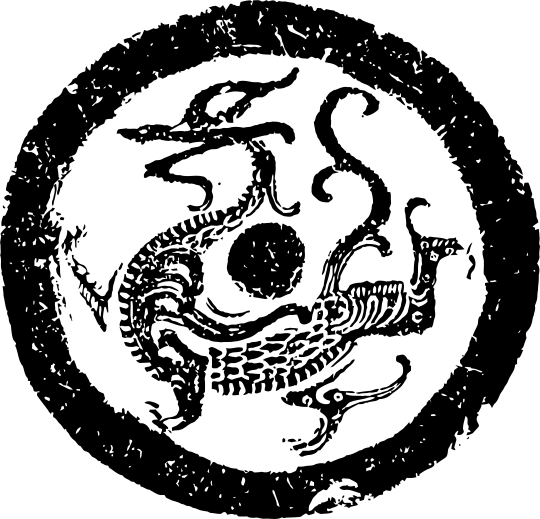
The giant beast inside the prison is Kaiming (开明兽), a mythical creature with nine heads from the abyss in Kunlun, described in the Classic of Mountains and Seas.
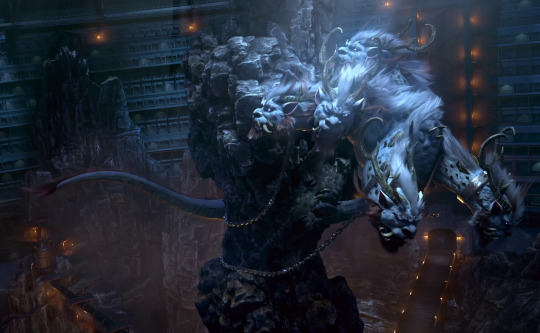

The Sword of Cutting Immortals belongs to Yuding.
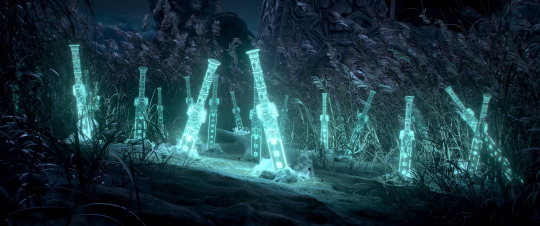
Shen Gongbao refers to Yuding as sect brother. Strictly speaking, they are indeed sect brothers as they were both Yuanshi Tianzun’s disciples from the same generation, and Yang Jian’s seniors.
Shen Gongbao quotes a line from the poem “善哉行” by Cao Pi.
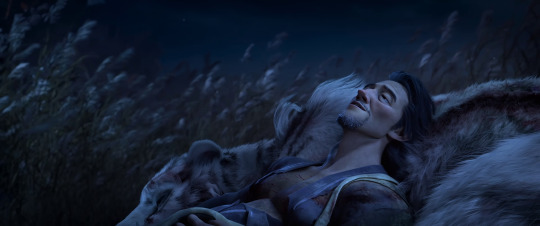
The first time we see Chenxiang’s primordial spirit manifest, it glowed green and was shrouded in smoke due to the influence of Shen Gongbao, holding a dagger and wearing a bamboo hat.
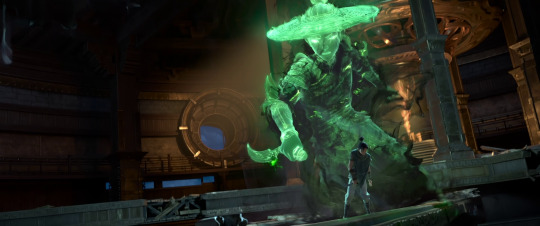
Later when he’s been around Wanluo for a time, it turned pale gold while he gained tendril-like chains, similar to Wanluo’s threads, with daggers on the ends of them.
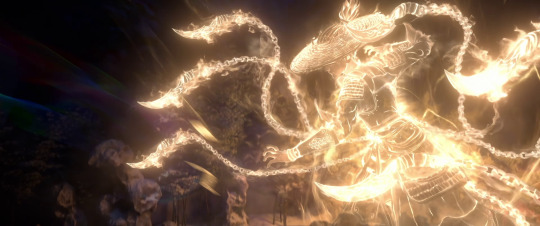
By the time he was ready to cleave the mountain after having followed his uncle around and learned Nine Turns Mystical Arts, we see the final evolution in the form of a vibrant gold figure that has lost the bamboo hat and now fully embodies a little general.
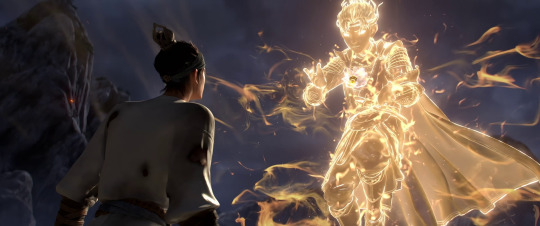
Jian drops into Chang’an, the Imperial City in the mortal realm in the midst of a civil war during the Jin dynasty. The Eastern Jin dynasty was in near-constant conflict with the northern states for most of its existence.
Chang’an, located in present-day Xi’an, has a lot historic significance as the capital of several major dynasties in Ancient China, and is a treasure trove of cultural relics.

Mount Li is a scenic location about an hour’s drive from the Fortifications of Xi’an. A complex of hot springs are located in the area known as Huaqing Pool, likely serving as the basis for Duyue Pool.
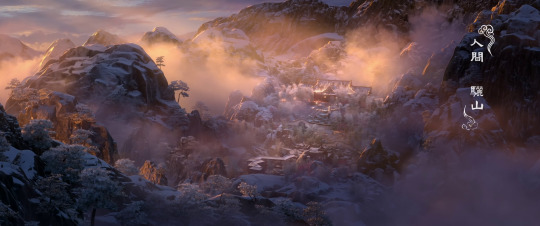
This scene is gorgeous.
Wanluo tells the story of King You of the Zhou Dynasty at the Beacon Tower of Mount Li, who was slain in 771 BC. The tower still stands today as part of the Huaqing Palace complex.

Further west is Mount Hua, the sacred mountain known as the "Western Mountain" of the Five Great Mountains of China. Lotus Peak is located on the western side of the mountain.
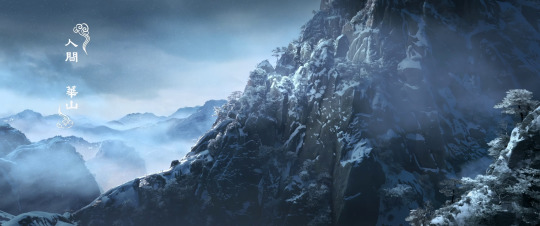
The paths leading up the mountain involve steep staircases, vertical ascents, and narrow plank trails bolted onto the cliff face, often labelled as some of the most dangerous hikes in the world.

The Nine Turns Mystical Arts (九转玄功) is the unique ability of Yang Jian. It grants him vast, physical durability of undefined limits and nigh-invulnerability to conventional weapons and various magic spells.
youtube
This was such a bittersweet moment when he stopped the wind chimes.

The scene where Chengxiang paused at Shen Gongbao’s monument was heartbreaking.

365 gods were canonized at the Investiture Altar of Mount Qi. Shen Gongbao was the last one on the list.
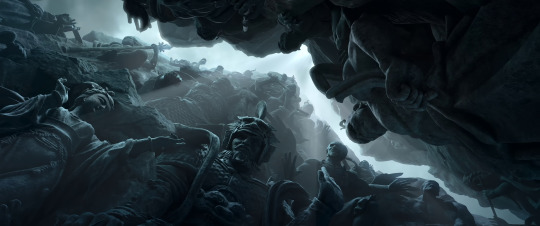
Yuding borrowed the Deity-Binding Chains from his master Yuanshi Tianzun, which were confiscated from Tu Xingsun. Tu Xingsun once used them to bind Nezha, Huang Tianhua, Jiang Ziya etc.

The Yin Yang Scroll belongs to Taishang Laojun, who along with Yuanshi Tianzun and Lingbao Tianzun make up the Three Pure Ones - three highest gods in the Daoist pantheon. In IOTG, Yuanshi Tianzun’s disciple Chi Jingzi also borrowed it to subdue Yin Hong.
The text on it comes from “Taishang Laojun’s sutra of everlasting tranquility” (太上老君说常清静经).
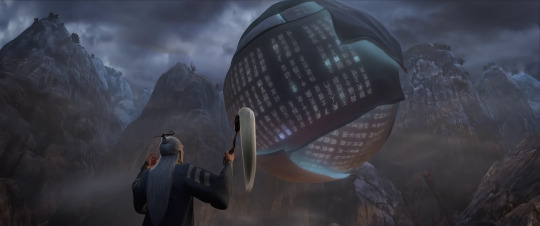
Part 1|Part 3|Part 4
#new gods#new gods: yang jian#yang jian#新神榜#杨戬#新神榜:杨戬#xin shen bang#jttw#investiture of the gods#lotus lantern#Youtube
47 notes
·
View notes
Text
Animation Night 165: New Gods
嘿朋友动画的晚上正在上映电影!
One day I'll make a new friend who speaks Chinese and I can ask to come up with a different intro for donghua-related posts ;p
Long time Animation Night viewers might remember Animation Night 102 a little over a year ago, in which we watched a film called 新神榜:哪吒重生 (New Gods: Nezha Reborn) - not to be confused with other recent Nezha-related films like Ne Zha.
And it was pretty sick. Essentially you've got a CGI film set in a kind of FF7-like dieselpunk world in which various mythological figures now run crime syndicates or ride cool motorbikes. The film followed someone who turns out to be the reincarnation of Nezha - where Nezha's old enemy, the East Sea Dragon King, is also reincarnated as a kind of mafia kingpin who doesn't know to leave well enough alone, and picks a fight, hoping to stop the new Nezha fully incarnating.
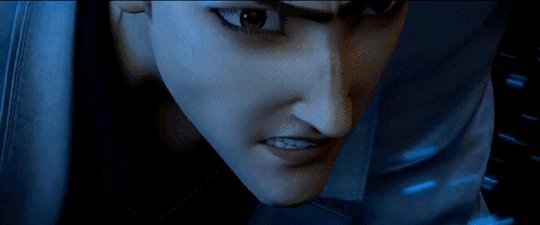
As CG films go, there's not a lot to compare it to - except perhaps Lupin III: The First, which also has the kind of smooth, slightly stylised figures and fancy effects. It was a bunch of fun, lots of twists and turns, guys who look like Sun Wukong but aren't (...maybe?), betrayals, and of course plenty of slickly choreographed fantastical martial arts.
Well, sure enough, Nezha was the first in a series! The second film in the series, New Gods: Yang Jian came out last year...
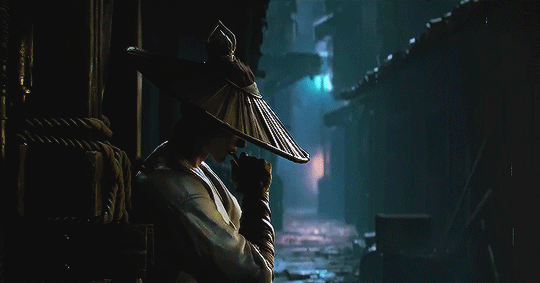
This one focuses on another character from the Investiture of the Gods, Erlang Shen (二郎神), who's got a bunch of other names, notably Yang Jian (楊戩), which is the name he takes in Investiture of the Gods. I definitely needed to read up on this guy, so here's a primer: Erlang Shen's a god, nephew to the Jade Emperor, and a rather righteous one, associated with traits like purity, decency, and slaying monsters. Physically, his major trait is the truth-seeing third eye in the middle of his forehead; he also likes to carry a three-pointed spear, and his signature technique is '72 eartly transformations', i.e. turning into pretty much anything.
In Investiture, he shows up as a discple of the immortal Yuding Zhenren (玉鼎真人) during Chapter 40, in which Jiang Ziya battles the four 'Diablo Brothers' Mo Lihong, Mo Liqing, Mo Lihai and Mo Lishou, essentially a bunch of evil wizards who are causing havoc. Now, bear with me here. Mo Lishou has a powerful flying mink (or maybe an elephant). Yang Jian deliberately lets himself get eaten, and then when Lishou sends the mink out to attack, he transforms inside its stomach, popping it from the inside as it's about to fight Jiang Ziya.
Then, Yang Jian transforms himself into the mink, and uses this disguise to get close to the brothers and steal a magic umbrella from Mo Lihong, giving Jiang Ziya the chance to win the battle. Pure TTRPG player strategems here honestly. Love it.
He also shows up in Journey to the West, in which he's sent to try and deal with the Sun Wukong problem. They have a classic transformation battle, which Yang Jian eventually wins by seeing through Sun Wukong's clever disguise as a temple, and teaming up with Laozi (yeah¸ the Tao Te Ching guy) to capture him.
All in all, Yang Jian is not a god to be trifled with.
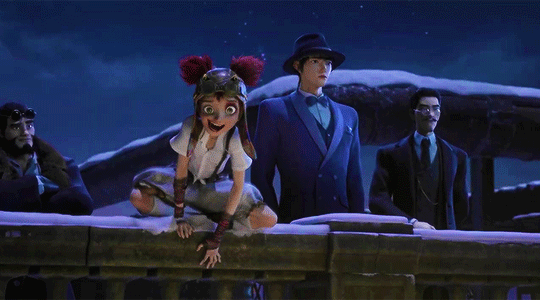
However, the main story about Erlang Shen/Yang Jian is none of these, but a folktale called The Magic Lotus Lantern, in which he plays the role of antagonist.
The Magic Lotus Lantern tells of the goddess Huayue Sanniang, who falls in love with a mortal scholar called Lui Yanchang. Her older brother Erlang Shen, here a god, does not approve, to the point that he's willing to fight her about it. However, Huayue Sanniang wins the fight using her magic lotus lantern, and marries Liu Yanchang. Together they have a child called Chen Xiang. With me so far?
Unfortunately, Erlang Shen isn't about to take this whole thing lying down. After seven years, he tracks them down by the light of that same lantern, and briefly abducts Chen Xiang, before stealing the lantern and sealing Sanniang under a mountain (Mount Hua).
Nine years later, Chen Xiang - now 16 - learns what happened to his mum. He goes on a journey running into a number of mythological figures, including Sun Wukong, who teaches him martial arts. Indeed, Sun Wukong is like you know what kid you're pretty strong, I'll make you a big old axe to get your mum out of that mountain. At the end of it all, Chen Xiang goes and battles his uncle, and loses... but at the last minute he gets a special lotus lantern powerup, which gives him the chance to win the battle and free his mum from the mountain.
youtube
Incidentally, if you will permit a tangent (that is at least animation relevant lmao) - this story was adapted to animation in 1999 as 宝莲灯 (Lotus Lantern), and in fact that's quite a notable film in itself. To briefly tell the story again, from the 50s onwards, the vast majority of animation in China happened under the roof of Shanghai Animation Film Studio. However, during the Cultural Revolution, most of the major animators at SAFS such as Te Wei were cast as reactionaries sent to the countryside to do hard labour, practicing drawing only in secret. Chinese animation entered a period where the only permitted form was propaganda films in a narrowly defined realist style.
Following the end of the Cultural Revolution, many of these animators returned to the studio, making celebrated films like 哪吒闹海 Nezha Conquers the Dragon King (1979) as well as all sorts of short films celebrating an end to their ordeal and railing against artistic censorship. However, the studio's output - and Chinese animation in general - declined in the ensuing decades, with Chinese studios mostly doing outsourcing work and younger audiences turning to anime and western animation. So far so familiar.
In 1992, the studio started to reorganise itself along Western lines, collaborating with a company called Prrfect Animation from San Francisco. [This information comes from an article in Animation World Network, which is incredibly light on details. I can't find any other mention of Prrfect Animation outside of its connection with SAFS.] The studio would soon become part of the new Shanghai Film Group Corporation.
And in the middle of that period comes this movie - a kind of turning point for donghua. You can a restoration on Youtube, albeit unsubbed. Visually it's definitely got traces of the Cultural Revolution-era style, narratively it hews fairly close to the Mouse's formula complete with songs; indeed, allegedly this movie beat them at their own game in 1999.
Anyway, we're not watching this movie tonight - vibeswise it would be a weird combo, and it's going to take a little work to find suitable subs and mux them in, but put a pin in this, we might just come back to it.

So what about this film? In this world, Yang Jian is now living a quiet life as a bounty hunter. Here's the official English-language plot summary, which is very brief:
Twelve years after imprisoning his sister underneath a mountain, Erlang Shen, a god known for his all-seeing third eye, now works as a bounty hunter. A woman hires him and his crew to prevent his nephew, Chenxiang, from obtaining a magical lotus lantern that holds great power.
Beyond that? I can tell you that at some point he wears a fedora. Look, it's in that gif right there. Yeah, I'm flying a little blind on this one ^^'
As things turned out, I didn't end up seeing this at Annecy, since it clashed with Rintarō's new short film... but fortunately, it is now available in the usual places. So the plan tonight is pretty simple: we will be watching both New Gods films, first a reprise of Nezha and then the new Yang Jian.
Also! We're actually on time! I'm gonna go live a lot earlier than we've managed lately, namely 8pm UK time, which is about 3 hours from this post (if you're in the States, that will be midday Pacific time, 3pm Eastern time). The place is, as ever, twitch.tv/canmom. Hope to see you there~
13 notes
·
View notes
Note
I feel like the jttw fandom sometimes portrays that Erlang betrayed Yuding by joining heaven in a certain way (he's a rebel, but will he support them or do they have some ideals in common?) or when Erlang punished his sister. I also remember that someone mentioned a parallel about how Puti and Yuding would feel betrayed by SWK and Erlang's actions. I don't know if you mentioned anything about the relationship before. But could we call it betrayal? Genuine question. Nor whether adaptations of the legends of Erlang could have touched on this topic. Idk if adaptations of Erlang's stories mentioned this topic.
I feel like the jttw fandom sometimes portrays that Erlang betrayed Yuding by joining heaven in a certain way (he's a rebel, but will he support them or do they have some ideals in common?) or when Erlang punished his sister.
I think it still stands that Erlang is considered more rebellious than many gods of the chinese mythos. This is still portrayed in JTTW if you notice how Guanyin was the one that had to recommend Erlang's services, not the Jade Emperor. That and the Jade Emperor had to pay Erlang for his service when anyone else was following orders.
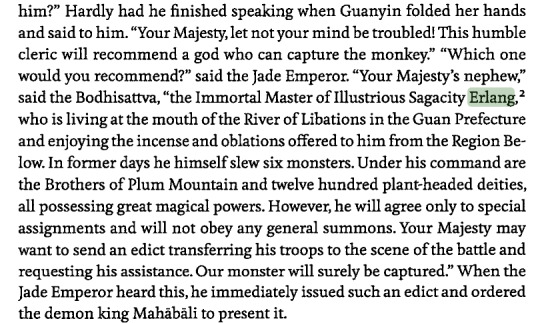
I can't say what most people accept but I always saw it that Erlang Shen doesn't follow orders he doesn't believe in. That he joined heaven because he does believed that there must be law and order not only for the preservation of the world but also for the sake of balance between the three realms. He understands when Heaven must be questioned but also personally has experienced what it means to break Heaven’s laws, seeing how his own mother broke Heaven’s rules and this crime led to the death of his father and brother. If there was something he didn't believe in or didn't approve of, then I don't think he would follow said orders. I still like to think that heaven sees him as a double-edged sword, it is good to have him on their side but if any of the celestials step out of line he would be the first to act.
Erlang and Sanseng are both considered to have trained under Yuding, and they both joined heaven. Erlang had a single mission in mind, and that was to save his mother, and in his tale he was able to complete that quest, from then on out he would have no other conflict with heaven as long as he completed his mission. There was a chance that Erlang and Sanseng could have continued as immortals separated from heaven but they would still be followed under Eastern Heaven if they wished to be considered true immortals. Their being given the rank of deities would give them more freedom but also give them restrictions. There would be a risk of confrontation perhaps if they didn't join heaven.... but them joining the ranks of deity would not only allow them to work alongside their mother but also that their status in the immortals would never be questioned or challenged.
I don't think that joining heaven would have been seen as a betrayal... but I do think that Erlang putting his sister under the mountain could have been seen as one as that is a far more complex matter.
I have personally said this before that I think Erlang Shen kinda resents how his family turned out. His older brother and father were killed and his mother was trapped under a mountain because of his mother's crimes. While yes he saved his mother, there was nothing he could do for his brother or father. Not even fighting heaven and seeking revenge would help, rather it would cause more harm to others if he fought all of Heaven. He knew what it meant to go against heaven and what that meant for an anyone that wanted to start a family, what they would put their children through. Erlang Shen saw his sister commit the same acts that their mother did and perhaps... he felt betrayed by her actions on some level as well. That his sister would put her child through the fear and danger of being hunted down by heaven like they were. Nothing whether heaven was right or wrong to hunt them down in the first place, but that the outcome would be the same for her as it was for them.
That is why I think Erlang Shen was willing to put Sanseng Mu under the mountain, that he thought he was doing the right thing, as if trying to justify what happened to him. It makes him really multifaceted in how he responds to seeing his sister repeating their mother’s crimes and him resenting his own human nature, that connection to his dead father and brother, and what trauma it has caused him. I'm not saying that he was right to do so but that it gives him an explanation as to why he would do such a thing to his own sister. And in trapping her under the mountain he betrayed Yuding as well. He trained Erlang to fight against heaven to save his family, not to be the one to put it under again.
I think that Yuding would always want for Erlang to follow his own path, whether that aligns with heaven or not. Erlang was recruited by heaven, trying to justify his own pain that it was needed for him to grow, and thus he was trapped in the same cycle that trapped his mother, to trap his sister, trying to hold on to the idea that the pain that heaven did to their family was justified and thus justifying his own actions against Sanseng and her family. He resents that part of his human self as that is a constant reminder of why he was hunted down in the first place. That he always needs to suppress that and any reminder of that as well.
I feel like that is what makes Wukong and him good parallels in that Wukong was rejected by heaven but he still followed his own sense of justice. They both fought heaven, but Wukong believes he was wronged by Heaven’s disrespect and Erlang for the injustice his mother for the sake of family. However Yang Jian was the one to join heaven’s forces after his rebellion making a place in heaven while Sun Wukong believed he was owed more and more, pushing to the point of stealing three types of immortality. Erlang and Wukong refelct each other, both limited by society and their own desires to either follow their choices to their own destruction or learning how to change and adapt to their surroundings. Wukong is the one to try to overthrow heaven to fit what he deeps is ‘right’ through might. And Erlang instead joins heaven and choose to change what he deems is 'right’ while still within the laws. They are both outcasts (Wukong a yaoguai, and Erlang a product of an illegal union), both fought the Jade Emporer (Wukong for the sake of his status, and Erlang for the sake of saving his family), and both either being punished for their crimes or joining heaven, but only on THEIR terms. Erlang only joined heaven after his mother was saved and Wukong only joined heaven when he reached enlightenment and is no longer under the control of anyone in Eastern Heaven. They ended up in the same place but also refused to give up their personal freedoms as well.
I go off a lot here about their foils.
I also remember that someone mentioned a parallel about how Puti and Yuding would feel betrayed by SWK and Erlang's actions.
I can see something like that.
Wukong was exiled by Puti because Puti knew that Wukong's ambition grew too strong for not even heaven could control. He denounced him before he could even commit his first crimes, but Master Puti was wise enough to know what the future had in store. His most prized disciple led to one of the most devastating attacks on heaven. Puti prepared Wukong to take on anything but he never wanted him to on heaven and thus condemning Puti as well.
Yuding on the other hand had an active role in helping Erlang fight against heaven, to use his powers to save his family. He was able to do so, even gaining protection in his status by ensuring heaven wouldn't attack his mother or sister by gaining deity status. But in the end Erlang gave in to the cycle of pain and trapped his own sister. Using the powers that Yuding helped BOTH of them cultivate to harm each other.
I go off a lot here about Erlang's possible emotional turmoil with himself and why he would put his sister under a mountain out of his own free will.
I don't know if you mentioned anything about the relationship before. But could we call it betrayal? Genuine question.
I suppose as much as you could call Wukong going against Heaven a betrayal.
In the master-student relationship, students are meant to be seen as an extensions of their masters, that their actions reflect on their teachers, and that teachers can even be held responsible for their students' crimes as well.
Wukong by being Puti's student was not only to learn his power, but his ideals as well. But his ambition and desire for recognition and power made him discredit his master's teachings. Master Puti shows to value wisdom and personal growth focusing on the importance of cultivation in how it can help you rather than what it can do for you. Wukong was so desperate to learn for the sake of getting stronger but he never considered the consequences of his actions which led to him being cut off. Perhaps Wukong's lack of accountability could be seen as a betrayal if you think that if a person that you trust and care about isn't willing to change for your sake is the same then you can see it as such.
And Yuding could be in a similar case where he took in both a wayward Yang Jian and Yang Chan in order to save their mother and save themselves. They were being hunted by heaven, the only way they could survive was to learn cultivation, not out of personal desire but for the sake of their own security and saving their mother as well. Joining Heaven doesn't have to necessarily go against that, as their own convictions could align with the heavens as well but that Erlang used his power to try to justify what happened to him to repeat the cycle with his mother could be seen as such.
Students learn tools from their teachers and if they misuse what they have learned then it would be on them for such actions. A lot of this is speculation but I think that masters who see their students taking what they have personally taught them for purposes that go against their philosophies as well would have a sense of responsibility and thus a feeling of betrayl as well.
Nor whether adaptations of the legends of Erlang could have touched on this topic. Idk if adaptations of Erlang's stories mentioned this topic.
I haven't seen enough Erlang Shen media to know how often this topic is talked about or if there are any popular media interpretations of this. I would love to see a lot more of this actually! Not all Erlang Shen media follows the Lotus Lantern lore where he is one out of three siblings, as I have seen some where he is an only child like in the Li Erlang take. I know he is in a lot of FSYY media as well but not sure if that goes into his master-student relationship all that well.
In any case this is something I would love to see more in and def something I will try to watch more for my own sake as well.
#anon ask#anonymous#anon#jttw#sun wukong#journey to the west#xiyouji#ask#erlang shen#yang jian#li erlang
29 notes
·
View notes
Note
The way that Erlang's parents meet and how his mother is rescued varies a lot across traditional storytelling as seen on stage and in recitation. I'll list out the versions I found:
Taiping Geci Recitation: "Splitting the Mountain to Save Mother"/"劈山救母". Erlang lives in Heaven and spends his days hunting. He shoots down a pair of phoenixes and his grandfather the Jade Emperor rewards him with divine liquor. He falls asleep and dreams of his mother, causing him to ask the JE what happened to her. The JE weeps in shame and asks Erlang to seek out the Queen Mother of the West. She tells him that his mother married a mortal, and after having a son, washed the baby's diapers and polluted the seas. Heaven's armies were sent to capture her, but Sun Wukong shut her under Mount Tao. Erlang goes to Taishang Laojun, who tells him about Pan Gu's axe. Erlang goes into the mortal world and finds the axe has gained sentience as a demon. he defeats it and chops open Mount Tao to save his mother.
Bangzi Opera, Cantonese Opera, and Drum Recitations: "Third Princess Goes to the Mortal World"/"三姐下凡". The JE's daughters all go down to the mortal world to view festival lights. Erlang's mother meets his father and falls in love. She escapes from her chaperone, the divine general Hua Guang, and recruits the local Tudi couple to be her foster parents so she can marry Scholar Yang. She gives birth to Erlang, but the JE finds her and sends various gods to capture her. She fights all of them off except Guan Yin, who persuades her to surrender herself. JE imprisons her in the Heavenly Dungeon, where she gives birth to her daughter. Erlang grows up in the mortal world with his father and is teased by his classmates over having no mother. His father tells him about his mother's imprisonment and he goes off to rescue her. Erlang acquires divine arts, weapons, armor, and a horse from the immortal Yuding. He heads up to Heaven, where QMW warns him that JE will send out multiple trials to test his willpower. He'll need to carry two great mountains on his shoulders to capture the 12 suns standing guard over the prison. He does so and frees his mother and sister, and his sister helps him attack JE's palace and force him to agree to pardon their mother.
Han Opera: "Taoshan Cave"/"桃山洞". Erlang's mother falls in lover with a mortal after realizing they're fated to marry. Unfortunately, Yuan Hong's (the monkey demon from FSYY) sister also believes she's fated to marry Scholar Yang. Erlang's mother recruits the local Tudi to help her do some tricks with an old tree that gets Scholar Yang to agree to marry her. Sometime after their wedding the monkey demoness attacks and tries to abduct Scholar Yang. Erlang's mother fights them off and carves her name onto the demoness's face. The demoness runs back to her brother, who attacks Erlang's parents in revenge, but is also beaten back, and during their battle, Erlang's mother brags about her name. Yuan Hong reports her to Heaven and gets help from the Dragon Kings and other gods to capture her. Erlang's mother entrusts her baby son to Taishang Laojun, and the united forces of demonic immortals and gods capture her. Yuan Hong shuts her beneath Mount Tao, where she gives birth to a daughter. Erlang grows up with Yuding. He eats special ox, tiger, and dragon buns, as well as peaches of immortality, then bathes in a mortality-shedding pool to gain his powers. He arms himself and goes to Mount Tao, where he defeats the demons and his dog kills the monkey demoness. He rescues his mother and sister and they head home to reunite with their father.
Puxian Opera: "Third Princess Goes to the Mortal World"/"三姐下凡". Basically the same as Han Opera, except Erlang's mother's rival is a dragon princess. Erlang is considered a freak by his father for having three eyes and given over to Yuding. After Erlang's mother mutilates her rival, the Dragon Kings fight her and imprison her under Mount Tao. Erlang's father is abducted and imprisoned under the sea for refusing to marry the mutilated dragon princess. Erlang grows up and besieges the Dragon Palace. The mutilated princess's younger sister comes out to fight him and they fall in love. She makes peace between him and her family and they free his father. Erlang goes to Mount Tao, where he frees his mother and sister. Their family is reunited.
Hunan Huagu Opera: "Zhang's Second Girl Goes to the Mortal World"/“张二姐下凡". Erlang's mother is the Second Heavenly Princess. She reads some Heavenly Scrolls and notices that two gods are yet to be born and decides to be the one who gives birth to them. She picks as her husband Scholar Yang, who's already married to a woman named Zhao Meirong. She takes Meirong's form and tricks Scholar Yang into believing Meirong is a demon. Meirong goes home to her father and brothers, who are outlaws that rule a certain mountain. Her father has Taoist arts and lights special incense to summon the gods and report this strange matter. The gods discover the Second Princess's identity, but even after having her children, she refuses to leave because she's truly fallen in love with her mortal husband. She is captured and shut under Mount Tao. Erlang is abandoned in the mountains and saved by Yuding. The second part is called "Splitting the Moutain to Save Mother"/"劈山救母". When Erlang grows up, Yuding sends him to a renowned swordsmith couple to forge him a blade that can split mountains. The raw material must be the Ox-King's horn and the fuel must be the essence of golden coal from Mount Mei. Erlang takes the form of the Jade-faced Fox, seduces the Ox-King, and saws off a horn while he's drunk. He then fights the spirit of the Golden Coal. She falls in love with him and willingly sacrifices her essence to fuel the forge. Erlang splits the mountain and saves his mother.
Teochow Opera: "Third Princess Goes to the Mortal World"/"三姐下凡". Erlang's mother goes to Earth to fight a three-headed demon dragon and his lackey, a dog demon. She falls in love with Scholar Yang in the process and takes the form of a huntress to marry him. They have a son. She is summoned back by Heaven and imprisoned under Mount Tao for forgetting her mission. Like in the Lotus Lantern stories, Erlang's father remarries and has another son. The brothers kill a classmate by accident. Erlang's brother is handed to the authorities while Erlang escapes and studies the immortal arts. He finds the very demons his mother was hunting now have their base over her prison. He defeats the dragon, turning him into his spear, then defeats the dog and turns him into his pet. He frees his mother and discovers he has a sister.
Thank you! I'm not familiar with operas at all, so this is a valuable list to people who want to know more about the other variants of Erlang's mom-saving stories out there, outside the premodern ones from the Lotus Lantern Summaries!
16 notes
·
View notes
Note
Was there any rationale as to who got what master in FSYY? Guangchengzi and Chijingzi teaching the two princes of the Shang Dynasty makes sense, as they have a reputation for being teachers of kings. Assigning Nezha to Taiyi also makes a certain amount of sense as Taiyi's main responsibility is saving souls from perdition. Nezha's two brothers train under two immortals with connections to Buddhism because of their syncretic origins. Wen Zhong, the chief Thunder God, learns from Doumu, the Daoist adaptation of Marishiten and the goddess of starlight. But then Qingxu-Daode Tianzun trains Yang Ren and Huang Tianhua, two powerful gods, but ones that have ambiguous reputations (all 60 Taisui and their lord Yin Jiao are perceived as very fierce, while Prince Bingling, in his role as a mountain god, has myths and folk legends of being lustful). And Yuding trains Yang Jian while Daoheng trains Wei Tuo/Skanda/Idaten, and Kakusandha trains the earth-affliated deity Tuxing Sun. Some matchups seem to be meaningful, others look more random.
In Yuding's case, I think it might be because he was mentioned as a sage of Western Shu aka Sichuan, the heart of Erlang worship, and thus they were made masters and disciples based on proximity.
Outside of Taiyi's relation to Taiyi Jiuku Tianzun, there's also a bunch of Song paintings of the sage, and the most famous one by Li Boshi featured him lying atop a lotus leaf, reading a book.
The painting itself did not survive, and we only know its content bc the poet Han Ju had written a poem about it, but this might be what eventually inspired the Lotus Resurrection Thing.
Aside from Wei Tuo, Daoheng has 2 other deified disciples, Han Dulong and Xue E'hu, who became the gods in charge of the addition and subtraction of fortunes, traditionally depicted as two young acolytes.
You are right that the matchup is pretty random, and I attribute that to the fact that the immortals themselves are pretty much OCs, whose only relation to any IRL deities/sages is their names.
10 notes
·
View notes
Note
What are the names of the fsyy immortal masters? The book translates the names into different ones. Could you please explain it? 🙏
Ah, the most irritating part of Gui Zhizhong's translation: names of immortal masters that are either too literal or make little sense.
Most of these are not their real names, just their Daoist names: a long, fancy title given to immortals and gods whose worship is sanctioned by the imperial court, as well as the religious name Daoists chose for themselves.
Sect leaders:
Yuanshi Tianzun (元始天尊) - "Heavenly Primogenitor"
Patriarch Tongtian (通天教主) - "Grand Master of Heaven"
Lao Tzu (老子)
Sage Zhunti (准提道人) - "Cundi/Candi"
Sage Jieyin (接引道人) - "Buddha/Amitabha"
Even though people like to HC that Yuanshi, Tongtian and Lao Tzu are the Three Pure Ones and Tongtian represents Heavenly Lord of the Numinous Treasure (灵宝天尊), that is not the case in the novel.
Why? Because Lao Tzu's special attack in Chapter 77 is "Three in One Breath", in which he split out 3 streams of Qi that turned into the Three Pure Ones.
The Chan 12:
Guangcheng Zi (广成子) - "Grand Completion"
Chijing Zi (赤精子) - "Pure Essence"
Sage Huanglong (黄龙真人) - "Yellow Dragon Immortal"
Ju Liusun (惧留孙) - "Krakucchanda"
Sage Taiyi (太乙真人) - "Fairy Primordial" (no seriously, what?)
Chief Priest Lingbao (灵宝大法师) - "Spiritual Treasure"
Heavenly Lord Wenshu of the Grand Dharma (文殊广法天尊) - "Heavenly Master of Outstanding Culture"
Sage Puxian (普贤真人) - "Universal Virtue"
Sage Cihang (慈航真人) - "Immortal of Merciful Navigation"
Sage Yuding (玉鼎真人) - "Jade Tripod"
Heavenly Lord Daoheng (道行天尊) - "Heavenly Master of Divine Virtue"
Qingxu Daode Zhenjun (清虚道德真君) - "Virtue of the Pure Void"
Generally: the last 2 characters of their Daoist names are job descriptions. 真人 = Sage, 真君 = True Master, 天尊 = Heavenly Lord, etc.
I...really don't feel like doing a list of all the Jie immortals that are only called by their Daoist names, bc there are just so many! And most of them were just named NPCs anyways.
However: they do have a lot of "Immortals" and "Holy Mothers" suffix. The latter in particular is very reminiscent of Ming folk religions like Luoism (罗教), with their veneration of maternal goddesses.
14 notes
·
View notes
Note
I feel that Yuding's role, if fsyy and Erlang story are put on the same timeline, contradicts itself. In Erlang's story, Yuding decides to help him and his sister even though that action could lead him into trouble with Heaven and the Jade Emperor. I feel that Yuding just like Erlang, doesn't like Heaven very much. However in Fsyy, all the immortal masters seem to know what will happen and which people will die (not all will be deified). Like, in Yang Jian new GODS, he is the villain.
on the one hand we have an immortal master who watches over Erlang and his sister and in fsyy he supports the bloody battle for deidification. I don't know if I'm looking at this from the wrong perspective.
Well, good news: Yuding doesn't appear anywhere outside of FSYY. He's not in any premodern Lotus Lantern stories, at least the ones I could find.
But, much like how people like to HC that FSYY and JTTW take place in the same universe, people also like to HC that FSYY, JTTW, and Lotus Lantern's Erlang are the same person.
And because Yuding doesn't appear in any premodern Lotus Lantern stories, you are free to make up whatever you like when it comes to his hypothetical involvement or reaction.
Like, your Yuding doesn't have to help Erlang + his sister. He may have only take Erlang in as his disciple. He may not even be aware that Erlang has a sister.
He could be aware of Erlang's true origin and what awaited him and just didn't care. He could have offered him every opportunity to turn back, but his student is just too stubborn for his own good.
For all I knew, maybe he's just itching to teach the OP Daoist art of Ninefold Mystics to someone who'll make the best use of it.
Furthermore, you can argue that the Chan immortals aren't really eager to work for Heaven, either, and just wanna fill the recruitment quota with less important people and be done with it.
Maybe, as long as their brightest students don't get Investiture'd (like poor Huang Tianhua), it's considered a win and good enough. What they do after that, who they pledge themselves to, is no longer their business.
At the end of the day, Lotus Lantern + Prequel's take on their master-student relationship is just one take, and if you don't like it, you pretty much have free reign to come up with your own!
7 notes
·
View notes
Note
I wanted to ask, has there ever been an immortal master (like Yuding, Taiyi or puti) had children or a wife? According to monkey-ruler, there is no rule that prevents them from having children or relationships since they are not gods, but I wanted to express your opinion. In most cases it is easier to interpret that they are dedicated to their teaching.
I feel like Sun Wukong is the only case of a master having children. but I feel like people don't consider it as canon so to speak.
This is less a direct answer to your question, and more of an exploration of Chan and Jie Sect marriage policies.
In one of my previous answers, I have mentioned that some scholars thought the Chan-Jie conflict was mirroring the historical conflict between Zhengyi and Quanzhen Daoists during the Ming dynasty.
And one of the evidence cited is quite a few Chan Sect members, like Jiang Ziya and Tuxingsun, are allowed to marry, which is true for Zhengyi Daoists but not Quanzhen Daoists, therefore the Jie Sect must be an expy of Quanzhen.
However, this doesn't really hold up to scruntiny, because Hong Jin, Princess Longji's husband, is from the Jie Sect, yet they still get married after his defeat.
None of these people are immortal masters, though. Just their students. Which may suggest that, like historical Ming sects, there is a divide between cloistered and non-cloistered Daoists: the former took a vow of celibacy and did not marry, while the latter did.
And man, the marriages in FSYY are not happy ones. The big three are arranged marriages: two of which are wartime marriages for political purposes and both involve a defeated foe. In Longji's case, it isn't as forced, in Deng Chanyu's case, it is absolutely forced.
Somehow, Jiang Ziya and Ma's peacetime marriage manages to be an even bigger whirlwind of toxicity, worsened by Jiang Ziya's terrible luck and business skills, until they get a divorce.
Like, at the end of the novel, after Ma commits suicide out of shame, she is deified as the Comet/Broom Star, which was also a slang for "jinx", a.k.a. people who brings bad luck.
(My personal HC is that Jiang Ziya just adds her name onto the Investiture out of sheer spite, and she spends her immortal life as the Celestial Realm's cleaning lady, getting the last laugh when Jiang Ziya's descendents in the Qi state got their throne usurped by the Tian clan.)
Also, the two wartime marriages are "divinely ordained" and "fated to happen"; in Longji's case, the god in charge of love and marriage, Old Man Under the Moon, came to persuade her personally.
You know, if I'm an immortal on either side, and happen to witness these marriages, I'll happily take my vow of celibacy and cloistered life because good fucking lord.
Edit: I guess Zhang Kui and Gao Lanying on the Shang side could be considered an unambiguously happy couple, if you leave out the "die in battle and get deified together" part.
5 notes
·
View notes
Note
if you are answering fsyy questions. I wanted to ask, I was reading an article, and it is said that Yuanshi Tianzun pushed Shen Gongbao to complete his destiny (because Shen's actions were necessary), so would that be a betrayal or manipulation of an immortal master to his student?
I know that most immortal teachers look out for their students, and at least try to get them out of trouble (master Puti seems like the exception to me but that's jttw). I think you also said that the immortals had committed crimes and broken the rule of not killing long before the events of fsyy, does that mean that Yuding Zhenren and Taiyi Zhenren committed crimes but they are never specified?
Interesting. I'd like a link to the article, but from a brief skim, the source that claim is based on probably came from Chapter 72:
看官:元始天尊岂不知道要此人收聚“封神榜”上三百六十五位正神,故假此难他,恐他又起波澜耳。
Context: after sending all those troubles in Jiang Ziya's way, he ambushed Jiang Ziya and tried to kill him, but was stopped and captured by Ju Liusun, who brought him to Yuanshi Tianzun for judgement.
He scolded Shen Gongbao for his petty grudge against Jiang Ziya, then commanded his subordinate warrior to trap him under the Qilin Cliff, to be kept there until the War of Investiture is over.
It was at this moment that the narrator suddenly informed us that yes, Yuanshi Tianzun knew this guy was vital in filling the 365 empty job positions in the Celestial bureaucracy, and was just...throwing that threat out as a test or something.
Shen Gongbao, of course, protested and was spared on account of his promise to never bother Jiang Ziya again, else his body would be stuffed into the "Eye of the North Sea".
He didn't intend to keep his promise, but the very act of making one set his fate in stone and meant the consequences of breaking it could not be avoided.
This sort of "fatefully binding statements/vows" is a trope that can also be found in other God-Demon novels, like JTTN. In fact, previously on Chapter 37, Jiang Ziya had broken one such promise to never stop and talk to anyone on his way to deliver the Investiture, and was almost talked into burning the Investiture by Shen Gongbao, thus Xi Qi was fated to fight 36 invading armies.
Now, to most modern readers, all these Fate and Destiny stuff probably sounds like bullshit, and characters using that as a rationale or motive, sketchy as hell/manipulative.
But it is important to remember that people in the past usually believe their own religion, and unlike JTTW where you can make a reasonable argument of satire, FSYY, in general, took Daoism and Confucian ideals more seriously.
So yes, from a modern reader's perspective, it would seem like Yuanshi Tianzun just let Shen Gongbao be a petty plotting asshole in order to complete ancient China's bloodiest pantheon recruitment program.
However, from the author's perspective, they were all agents of the Will of Heaven, willingly or unwillingly, thus Shen Gongbao was deified at the end, too, despite his punishment.
As for your second question: "failure to sever the Three Corpses" doesn't mean crimes, though killing probably is. In the former case, they could have just failed to rid themselves of worldly desires and entanglements represented/caused by the three supernatural parasites, believed to reside in the human body and lead to one's eventual death by Daoists.
#investiture of the gods#fengshen yanyi#Shen gongbao#wrote this answer in the airport#so sorry about the lack of citations
7 notes
·
View notes
Note
After Jade Emperor had Erlang's father and brother killed and his mother was captured, is it known who took care of Erlang and Sanshegmu? Or what did they do after that happened? Where did they go? Are there any media that mention that? Or can we assume that Erlang had to take care of himself and his sister?
I think that in Demon slaying chronicles, the comic, it is implied that Erlang had to take care of his sister on his own, but I don't know if it is different in other media or if there are mentions about it in stories and myths.
After Jade Emperor had Erlang's father and brother killed and his mother was captured, is it known who took care of Erlang and Sanshegmu?
Yes, we know that Erlang Shen went to train under Yuding Zhenren who we are to assume that both Erlang Shen and Sanseng Mu were trained as they were both able to cultivate to become gods when Erlang Shen confronted the heavens.
Or what did they do after that happened?
I can't say how long it took them to find Yuding but they must have been still relatively young at least. I haven't read Romance of the Three Kingdoms or FSYY so the details on my part are a bit blurry.
Where did they go?
Jinxia Cave located in the northern part of An County, Mianyang, Sichuan Province
Are there any media that mention that?
It's mentioned in Fengshen Yanyi and Romance of the Three Kingdoms.
Or can we assume that Erlang had to take care of himself and his sister?
He undoubtedly took care of himself and his sister for however long they were on the run until they found an immortal master to train under. But I can't say how long that time was really.
I think that in Demon slaying chronicles, the comic, it is implied that Erlang had to take care of his sister on his own, but I don't know if it is different in other media or if there are mentions about it in stories and myths.
I haven't read the Demon Slaying Chronicles but it looks really good! Art style if Peak!! There is a lot of media that does have Yuding in it such as:
Creation of the Gods I (2023)
Erlang Shen (2023)
The Legends of Changing Destiny
New Gods: Yang Jian (2022) (I have seen this one! Really good!)
The God of War (2022)
Erlang Shen (2021)
The Magic Lotus Lantern (2021)
Investiture of the Gods (2019)
Lotus Lantern Prequel (2009)
Investiture of the Gods (1990)
The Boy Fighter from Heaven (1986)
Highly recommend some of these!!
8 notes
·
View notes
Note
A FSYY question. Most of the Twelve Immortals of Kunlun are repackaged versions of preexisting deities. Guangchengzi and Chijingzi are primordial gods who acted as instructors for the prehistoric god-kings Huangdi and Zhuanxu. Wenzhu Guangfa Tianzun, Puxian Zhenren, and Cihang Zhenren are meant to be the past lives of Manjushri, Samantabhadra, and Avalokitesvara/Guanyin/Miaoshan respectively. Juliu Sun is meant to become the Buddha of Antiquity Kakusandha. Taiyi Zhenren is based on the Taoist god of salvation, Taiyi Jiuku Tianzun. Lingbao Dafashi and Qingxu-Daode Tianzun are split off from Yuanshi Tianzun's two "brothers" among the Three Pure Ones (Daode for Laozi, Lingbao for Lingbao Tianzun or Tongtian Jiaozhu). Huanglong Zhenren is either based on stories of dragons helping Yu the Great manage the flood or the figure of the Yellow Dragon that manages the asterisms in the center of the sky. Where, then, did Yuding Zhenren and Daohang Tianzun come from? They seem to be OCs created just for the book.
Also, in FSYY, Kakusandha's name is implied to be in the same style as his disciple's name, with a title in front and a surname as the final word. So Tuxing Sun = Earthwalker Sun, with his main technique being tunneling through the earth, and Juliu Sun = Imprisoner Sun, with his main weapon being his god-binding rope. Would this imply a deeper relationship for them than just master/disciple?
I actually remembered reading something about Sage Huanglong's origin in 西游新说十三讲: namely, he might be inspired by the story of "Lv Dongbin sent his flying sword after Yellow Dragon" (吕洞宾飞剑斩黄龙).
The version of the story in Xingshi Hengyan basically went like this (though the story of these two's conflict had already been circulating long before):
Lv Dongbin left the mountain he was studying on after getting a flying sword from his master, picked a (verbal) fight with the local renowned monk Yellow Dragon, lost badly, and decided to be a sore loser by trying to assassinate the guy with his flying sword.
Which he also failed at——he lost his sword to the guy and had to return to his master in shame.
It's very much a story Buddhists used to flex on Daoists, and in return, Daoists made their own versions where Lv Dongbin won to flex back at Buddhists.
The book made the argument that FSYY might also be following that story tradition, and firmly took Lv Dongbin's side, which kinda explained Huanglong's memetic loser status in the novel (seriously, I don't think this guy has ever won a fight).
You are right that Yuding and Daoheng are more or less OCs, to a greater extent than the others, but the name "Yuding" actually appeared in two Daoist texts.
庚道集, a book on external alchemy, had a chapter titled "The Ninefold Great Elixir of Sage Yuding of Western Shu", while the internal alchemy text 性命圭旨 featured a mnemonic chant attributed to him, alongside other historical Daoists like Zhang Boduan and Wei Boyang.
This suggested he might also be a venerable Daoist sage, active in the Sichuan area at some point IRL history.
As for Daoheng Tianzun: he also got two "likely" namedrops inside two Daoist texts. 太上灵宝朝天谢罪大忏 mentioned a 道行真空天尊, while 太上洞玄灵宝三十二天尊应号经 mentioned a 道行洞空天尊.
These are also works that fall squarely into the "gigantic pantheon list full of gods that almost never appeared outside of said scripture, or enjoy actual worship" category, so yeah.
As for Juliu Sun: the name is just the Chinese transliteration for Krakucchanda/Kakusandha, which could be written as 惧留孙/拘留孙/俱留孙. Though it wasn't impossible for Tuxing Sun's name to be based after his master for matching purposes, I don't think there is any deeper meaning to it.
5 notes
·
View notes